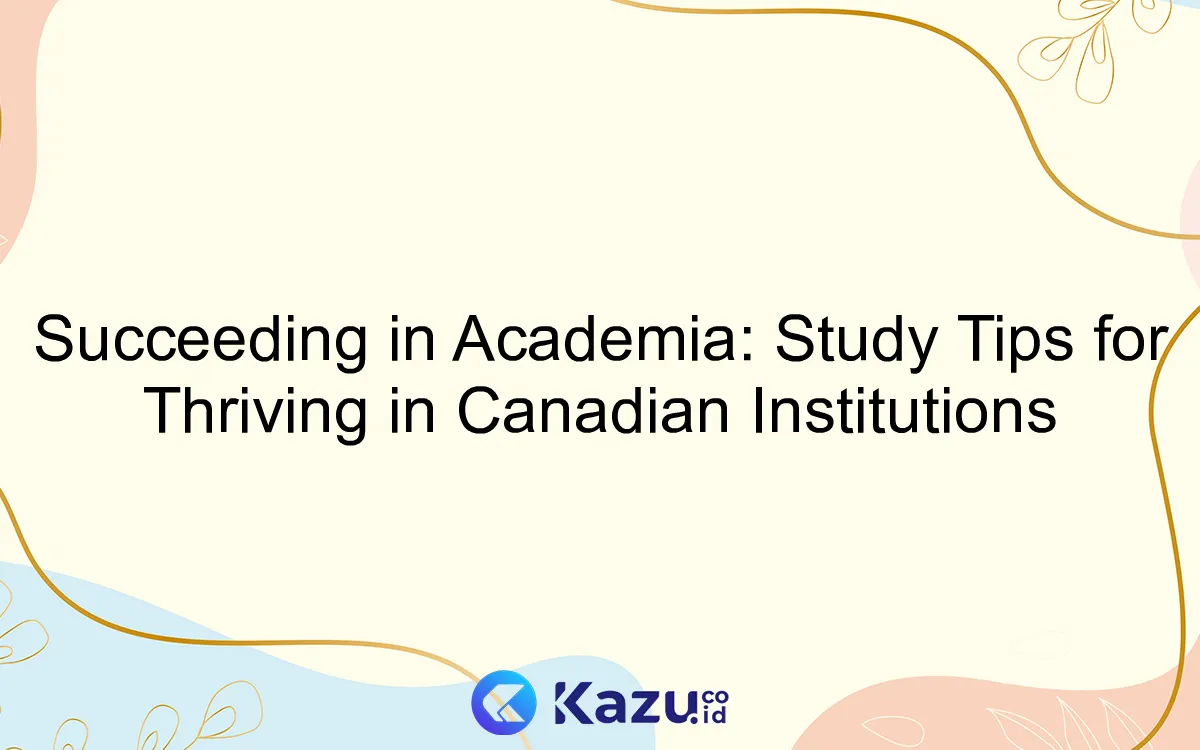Succeeding in Academia: Study Tips for Thriving in Canadian Institutions
Effective Time Management Techniques
When it comes to succeeding in academia, having effective time management techniques is crucial. Especially for international students studying in Canadian institutions, being able to balance academic responsibilities with personal commitments is key to thriving in this competitive environment. Here are some invaluable tips to help you manage your time effectively:
Create a Schedule
Start by creating a detailed schedule that includes all your classes, study time, and extracurricular activities. This will give you a clear overview of your daily commitments and allow you to allocate time for each task accordingly.
Set Priorities
Identify your most important tasks and prioritize them. Focus on completing high-priority assignments first before moving on to less urgent ones. This will ensure that you make progress on critical tasks and avoid unnecessary stress.
Break it Down
Large assignments or projects can often feel overwhelming. To manage them effectively, break them down into smaller, more manageable tasks. Set specific deadlines for each subtask, allowing you to work on them gradually without feeling overwhelmed.
Avoid Procrastination
Procrastination can be a major hurdle to effective time management. To combat this, develop strong self-discipline and motivation. Eliminate distractions, such as social media or excessive television, during scheduled study periods. Reward yourself with short breaks after completing important tasks to stay motivated.
Take Care of Yourself
Remember to prioritize self-care and allocate time for relaxation, exercise, and socializing. Taking breaks and maintaining a healthy work-life balance will help prevent burnout and improve overall productivity.
Seek Support
Don’t hesitate to seek support when needed. Reach out to professors, advisors, or classmates for guidance or clarification on assignments. Utilize academic resources provided by your institution, such as writing centers or tutoring services, to enhance your understanding and performance.
By implementing these effective time management techniques, you can optimize your academic performance and succeed in Canadian institutions. Remember, finding the right balance and staying organized is the key to thriving in academia.
Improving Concentration and Focus

When it comes to succeeding in academia, one crucial aspect to master is concentration and focus. Canadian institutions are known for their rigorous academic programs, so it’s important to develop effective study habits to thrive in this environment.
Here are some study tips to help you improve your concentration and focus:
- Create a dedicated study space: Find a quiet and comfortable space where you can concentrate without distractions.
- Eliminate distractions: Turn off notifications on your phone, close unnecessary tabs on your computer, and let others know that you need uninterrupted time to study.
- Break tasks into smaller chunks: Large tasks can feel overwhelming, so break them down into smaller, more manageable parts. This will help you stay focused and motivated.
- Use time management techniques: Set specific goals for each study session and allocate time blocks for different tasks. Consider using techniques like the Pomodoro Technique to enhance your productivity.
- Take regular breaks: Taking short breaks during your study sessions can actually improve your concentration. Use these breaks to stretch, hydrate, or do something enjoyable to recharge your mind.
- Practice mindfulness and meditation: Incorporate mindfulness exercises and meditation into your routine. These practices can help you train your mind to stay present and improve your ability to concentrate.
- Get enough sleep and maintain a healthy lifestyle: A well-rested mind is more capable of focusing and retaining information. Ensure you get enough sleep and prioritize a balanced diet and regular exercise.
By implementing these study tips, you can enhance your concentration and focus, leading to more productive and successful academic endeavors in Canadian institutions.
Developing Effective Note-Taking Strategies
Note-taking is an essential skill for students to succeed in academia, especially in Canadian institutions. Whether you are attending lectures, participating in discussions, or conducting research, having effective note-taking strategies can greatly enhance your learning experience. Here are some tips to help you develop effective note-taking habits:
1. Be Prepared
Before each class or study session, make sure you come prepared with the necessary materials, such as notebooks, pens, highlighters, or electronic devices. Being organized and having everything you need will facilitate your note-taking process.
2. Listen and Engage
Actively listening to the speaker or your instructor is crucial for effective note-taking. Pay attention to main ideas, key concepts, and supporting details. Engage with the material by asking questions, participating in discussions, and sharing your thoughts. This will help you identify important information worth noting down.
3. Use Abbreviations and Symbols
Develop your own system of abbreviations and symbols to save time and space when taking notes. For example, use arrows to indicate cause and effect relationships, asterisks for important points, and abbreviations for commonly used terms. This will allow you to capture more information efficiently.
4. Organize and Structure
Create a clear and logical structure for your notes. Use headings, subheadings, bullet points, or numbering to organize the information effectively. This will make it easier to review and revise your notes later on, as well as locate specific information when studying for exams or writing assignments.
5. Review and Reflect
Regularly review and reflect on your notes to reinforce your learning. This can be done shortly after class, at the end of each day, or during designated study sessions. Revise and add any additional information that may come to mind. By actively engaging with your notes, you enhance retention and deepen your understanding of the material.
Developing effective note-taking strategies is a valuable skill that will not only help you succeed in your academic journey but also contribute to your overall learning experience. By being prepared, actively engaging, using abbreviations, organizing your notes, and regularly reviewing, you will be well-equipped to thrive in Canadian institutions.
Enhancing Study Skills for Better Retention
In the competitive academic landscape of Canadian institutions, it is crucial for students to develop effective study skills that promote better retention of information. Excelling in academia goes beyond simply attending lectures and completing assignments. By implementing the following study tips, students can thrive in their academic journey and achieve success in Canadian institutions.
1. Establish a Consistent Study Routine
Creating a consistent study routine is key to enhancing study skills. Allocate specific time slots every day dedicated solely to studying. This structure helps train the brain to be focused and improves concentration during study sessions. Find a quiet and comfortable study environment free from distractions to maximize productivity.
2. Utilize Effective Note-Taking Techniques
Active engagement during lectures is crucial for better information retention. Develop effective note-taking techniques such as summarizing key points, highlighting important details, and organizing notes in a logical manner. This not only helps in understanding the material but also aids in revisiting and reviewing the information later on.
3. Engage in Regular Review and Self-Testing
Regular review and self-testing are essential study strategies. Instead of cramming information right before exams, allocate time throughout the semester to review previously covered material. Engage in self-testing through quizzes, flashcards, or solving practice questions. This active recall strengthens memory retention and solidifies understanding.
4. Seek Collaborative Learning Opportunities
Collaborative learning fosters a deeper understanding of the subject matter. Engage in study groups or seek opportunities to discuss course material with classmates. Explaining concepts to others not only reinforces your understanding but also exposes you to different perspectives that can enhance critical thinking skills.
5. Take Advantage of Resources Offered by Institutions
Canadian institutions provide a wide range of resources to support students’ academic success. Take advantage of these resources, such as tutoring services, writing centers, and academic workshops. These resources can provide valuable guidance and assistance tailored to your specific needs.
6. Practice Effective Time Management
Effective time management is crucial for balancing academic commitments and personal life. Prioritize tasks, create to-do lists, and set realistic goals. By managing time efficiently, you can maximize productivity and reduce stress levels.
Conclusion
By implementing these study tips, students can enhance their study skills, promote better retention of information, and thrive in Canadian institutions. Remember, success in academia requires dedication, consistency, and an active approach to learning.
Conclusion
In conclusion, succeeding in academia at Canadian institutions requires a combination of effective study habits and strategies. Students should prioritize time management, seek support from professors and classmates, utilize campus resources, and maintain a healthy work-life balance. By implementing these tips, students can maximize their academic success and thrive in the Canadian educational system.
